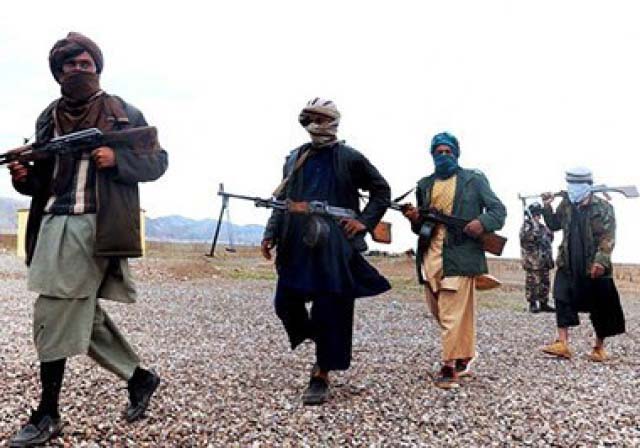According to reports, Sangin district fell to the Taliban after hours of fierce clashes that killed more than 90 soldiers in two days. The Taliban’s spring offensive was intensified following the appointment of Mullah Akhtar Mansour as its leader; the armed group captured new territories in northern and eastern Afghanistan. Addressing a press conference, Afghanistan’s Chief Executive Officer, Dr. Abdullah Abdullah said that “an urgent meeting will happen soon to take immediate security action in Helmand”.
The Taliban insurgents took over the northern city of Kunduz last month before it was driven out from the strategic city by Afghan forces backed by US air strikes. It was the first time the Taliban made such gains in Kunduz since the US-led invasion ousted them from power in 2001.
It comes as the resumption of peace talk – which derailed in late July weeks after its start – has come to the limelight. It is said that the broader understanding for restarting the peace process was reached among Pakistan, Afghanistan, the US and China during Afghan President Ashraf Ghani’s visit to Islamabad on December 09 for attending the Heart of Asia conference.
Pakistani officials believed that the biggest challenge to the start of the new process was the Taliban’s attack on Kandahar airport. Militants attacked the airport almost at the same time as Ghani landed in Islamabad for attending the Heart of Asia Conference.
Afghan High Peace Council denounced the latest attacks as “a slap in the face of peace”. Similarly, the former head of National Directorate of Security (NDS), Rahmatullah Nabil, resigned over disagreements with President Ashraf Ghani. Nabil, who strongly opposed Ghani’s moves toward a rapprochement with Pakistan, said in his letter of resignation from the National Directorate of Security (NDS) that there had been “a lack of agreement on some policy matters” in recent months. He said that the president had imposed unacceptable conditions on the way he did his job, with “repeated verbal summons” that put him under impossible pressure and forced his resignation. In an angrily worded post on Facebook that appeared before the resignation letter was made public, Nabil made clear his frustration with efforts to work with Pakistan, which many in Afghanistan accuse of controlling the Taliban. Nabil, in his Facebook post, said the blood of innocent people spilled in recent attacks was “the same color as the red carpet we trod like a catwalk”.
Thousands of civilians, soldiers and police have been killed as the Taliban has extended its grip on swathes of the country, piling pressure on National Unity Government (NUG). “The temporary seizure by the Taliban of Kunduz city, as well as 16 district centres, primarily across the north ... underscored the challenges faced by the government and security forces in maintaining stability across the country,” Nicholas Haysom, the Special Representative of the Secretary-General for Afghanistan is quoted as saying. He also said that between August 01 and October 31, 6,601 security-related incidents involving civilians were documented by the UN which, according to him, represented a 19 percent increase against the same period last year when 5,516 incidents were recorded. He warned of intense insecurity in around 25 provinces and indicated that the presence of the self-styled Islamic State (IS) was a matter of great concern. Regarding the Helmand province, he said clashes between security forces and insurgents intensified during the three-month period resulting in the displacement of about 2,054 families.
In spite of the reports about resumption of peace talk, the Taliban insurgents have increased their attacks across the country. Perhaps, the splinter groups intend to sabotage the plan for negotiation as ever. Previously, the revelation of Omar’s death and Akhtar Mansour’s appointment stalled the Murree talk. Mansour called the talk as “enemies’ propaganda” and organized heavy attacks in the country – which led to great casualties.
In fact, Pakistan used coercion, ‘diplomatic’ pressure and persuasion by its proxies within the movement to achieve the limited goal of the Murree meeting. These achievements were unlikely to last or contribute to the ultimate goal – a political settlement. An authentic change of mind in as fragile a process as peace-making has to come from within the Taliban movement itself, ideally through its own mechanisms of deliberations and policy-making. It is believed that if the Murree meeting had been a natural outgrowth of the Taliban’s internal policy-making, the movement would have most likely made sure all the various branches had been briefed. The Taliban would have taken measures before going into formal talks with the government. The most important would have been a thorough internal discussion with officials on the ground and making sure the talks were not portrayed as dictated by an external force, especially Pakistan.
The Taliban show no real tendency towards peace talk – their unmitigated offensives demonstrate the fact. I believe that the splinter groups and Islamic State militants pose great challenges to the peace process. Since some members of Taliban have pledged loyalty to the IS, they will be the first distracters. The government will have to respond to the recent attack strongly and the temporary seizure of Kunduz should have been an eye-opener for the officials. With the escalated militancy – which leads to the indiscriminate killings of combatants and non-combatants alike – one will conclude that the fruition of the ever-fruitless-tree of peace talk will be no more than a mirage and, therefore, it would be naïve of the High Peace Council (HPC) to seek with hope.

